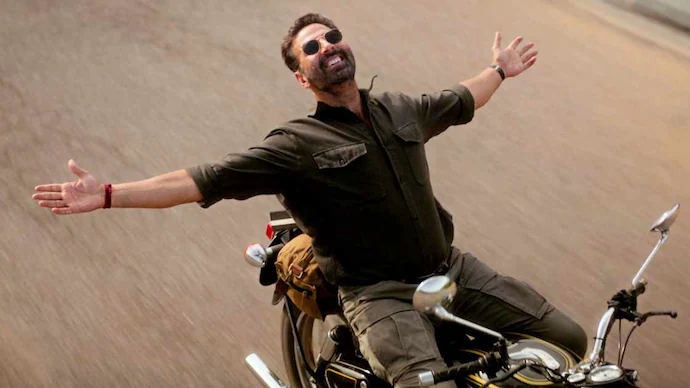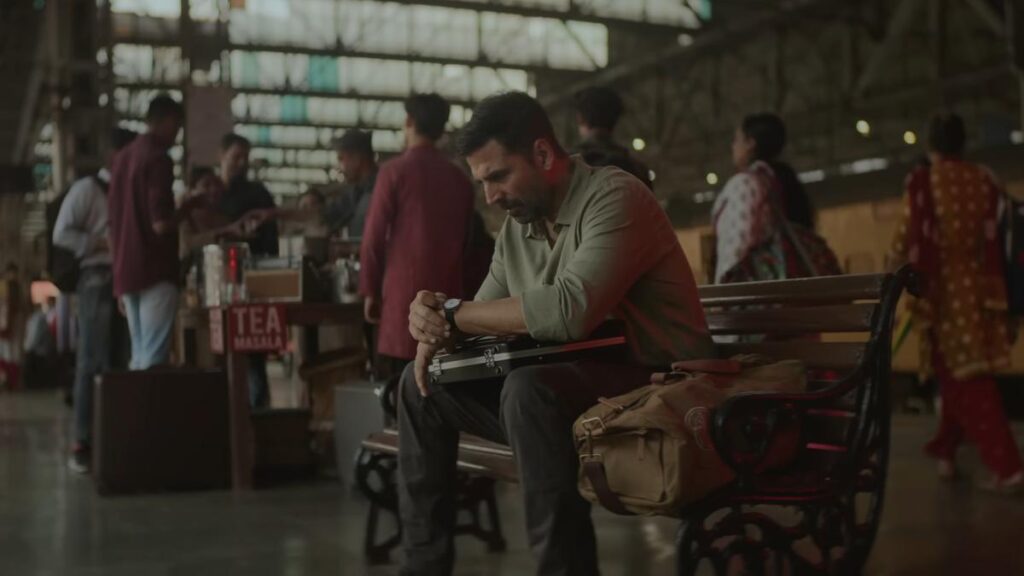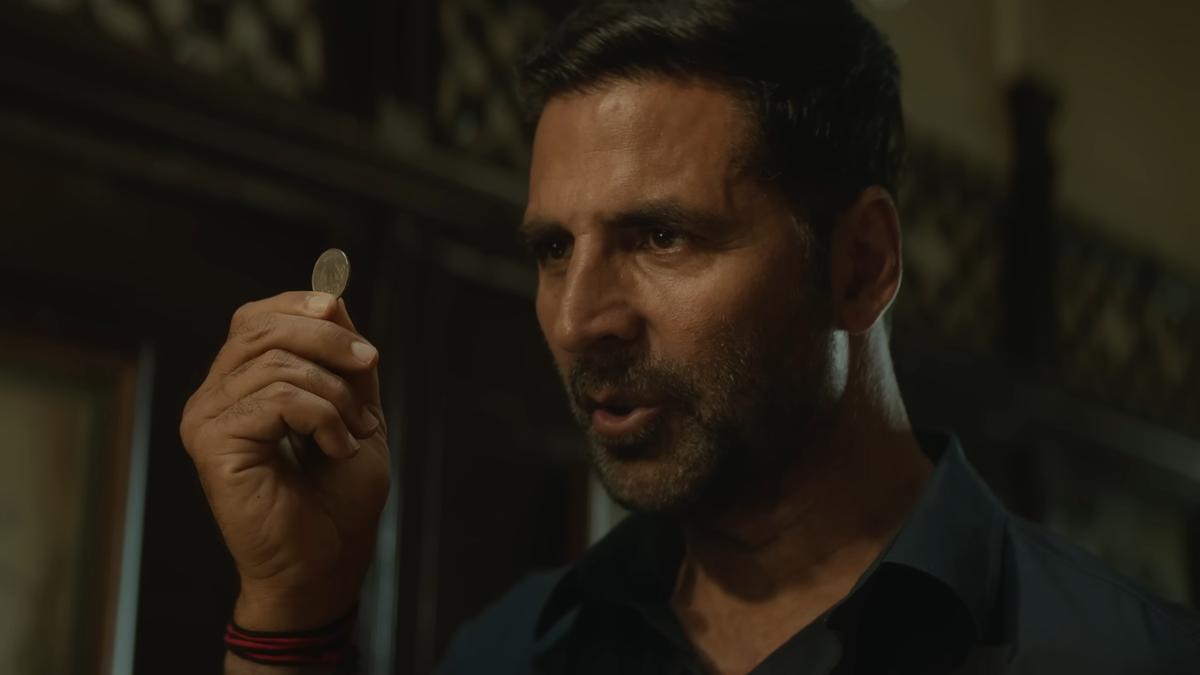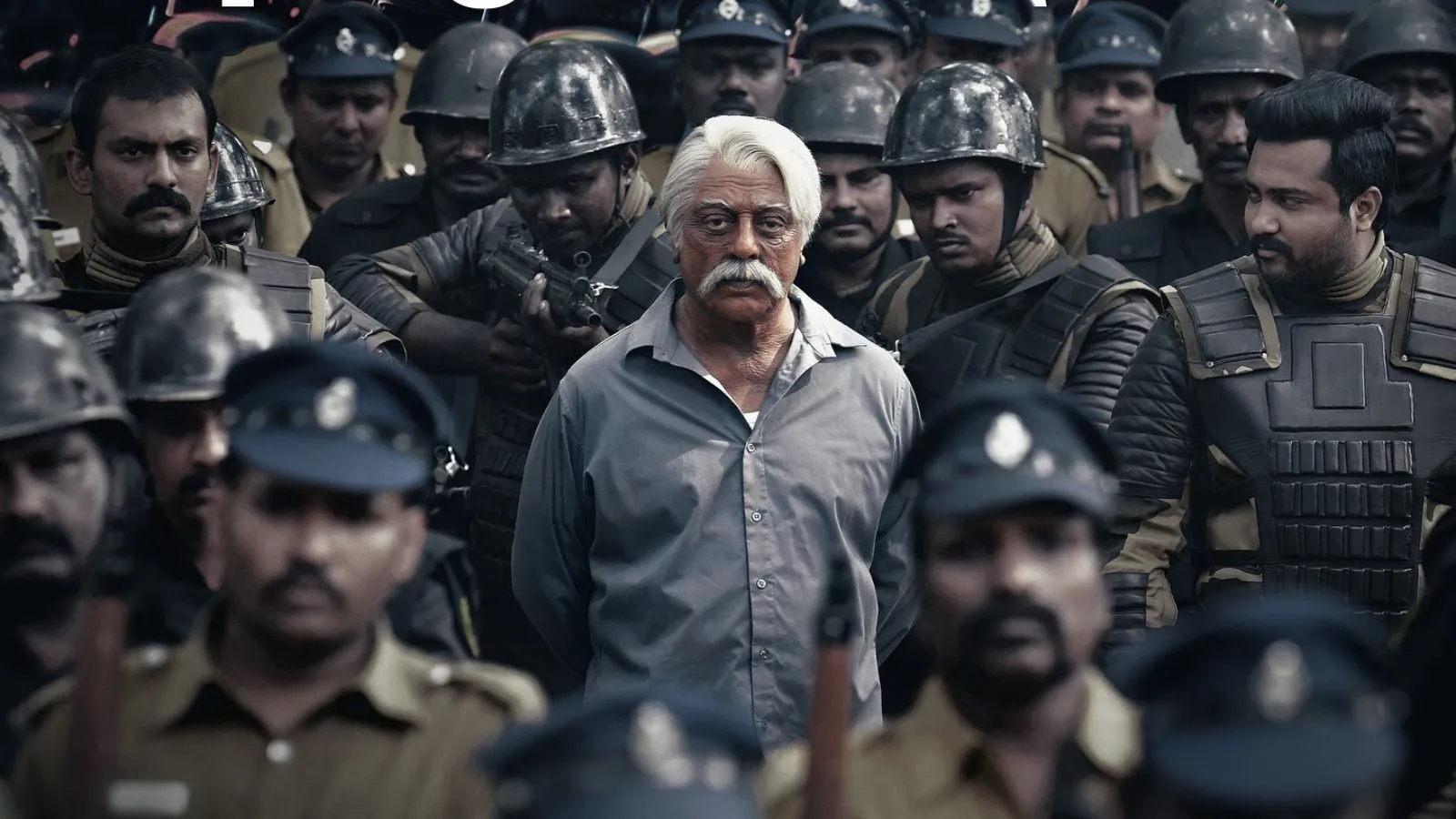Sudha Kongara’s Sarfira, a remake of her Tamil film Soorarai Pottru (2020) and adapted from the real-life events depicted in the book Simply Fly: A Deccan Odyssey by G. R. Gopinath is the tale of an underdog who dreams of spreading his wings high up in the sky by starting India’s first low-cost carrier airline. As he embarks upon fulfilling his near-impossible objective, he eventually confronts obstacles one after the other and tackles them with resilience and grit. It is an inspiring tale where an individual from the lower strata of society fights the authoritarian powers of a society that does not believe poor people have the right to be equals. The antagonist comes in the form of a rich and powerful business tycoon who has all the wealth and influence to manipulate the rules and regulations of the aviation department. As the story moves forward, we are made to believe that despite the numerous obstacles, the protagonist will have to win because he is representing the common man who inhabits the majority of the country’s population, who are denied their basic rights due to the massive corruption in our system. It’s a noble thought, but the sugar-coated treatment makes the film sound deeper and more interesting on paper than it is in execution.
Vir Mhatre (Akshay Kumar) is the son of an idealistic school teacher who follows the principles of Mahatma Gandhi. But Vir is an aggressive person who stages protests on railway tracks to get the government to allow the trains to halt at their village station. As the father and son have fundamentally different principles, a rift develops between them. Vir leaves home to join the Indian Air Force. While he is a cadet, he cannot afford a plane ticket to reach his village in time to perform his father’s last rites. This provokes, as well as inspires, him to use his knowledge of aircraft and entrepreneurial skills to start a low-cost flight service so that even underprivileged people like him can afford an air ticket. However, as he embarks on his benevolent journey, he does not realize that starting an airline is a monumental undertaking, and he makes enemies before his first flight can even take off. Paresh Goswami (Paresh Rawal), the owner of the expensive Jaz Airlines, whom he had considered his idol, becomes his biggest foe. In this battle between David and Goliath, his ambitious wife, Rani (Radhika Madan), becomes his pillar of support and helps him achieve his dreams.

Though similar in ethos, the climax of Sarfira is much more resonating than Soorarai Pottru in the way it has been staged. The scene where Vir refuses to join hands with a tycoon, as suggested by his close friends Chaitanya (Krishnakumar Balasubramanian) and Sam (Saurabh Goyal), and Vir asking for money from Rani is done with an economy that is much stronger than what we have seen in the Tamil version. But except for these two scenes and a few other details, the Hindi film is almost a scene-to-scene rendition of the screenplay written by Kongara and Shalini Usha Nair for the Suriya starrer film, who has a cameo in the end. For the sake of making the film in a different language, the film has shifted from villages in Tamil Nadu to Maharastra, and so instead of Tamil, the characters speak mostly in Hindi. One can justify the reason behind the remake, though, as the big screen experience.
Due to COVID-19, Soorarai Pottru was released on Amazon Prime, where the Hindi version of the film is also available. So, by releasing the film theatrically, one can experience the larger-than-life feel of watching a tale where the good wins over the evil. This could be a reason meant more for pacification than logical reasoning. So, analyzing either version is essentially the same. Unlike the Tamil film, here too, the protagonist’s struggles and the overall story are made to seem more optimistic or idealized. It glosses over the harsh realities to make it more palatable for the audience. Where the film effectively strikes out by showing that whenever Vir inches closer to fulfilling his dream, he receives a blow delivered by the unscrupulous Goswami. With each failure, Vir becomes stronger and keeps the narrative wheel moving, as well as earning our empathy. It becomes a storytelling strategy that resonates well with the intended purpose of keeping us hooked on the plight of the protagonist. But the events in the film happen so rapidly that we grasp for a breathing space. The melodramatic scenes such as Vir meeting his mother (Seema Biswas) after the demise of his father, the random intrusion of song and dance, Vir asking for help at the airport, and several other scenes could have been toned down. The choice would have given the film renewed beauty and style and saved it from the languorous approach of sheer imitation.

While considering the performance, Akshay Kumar, as Vir Mhatre, put his tooth and nail into the character and played the role with the utmost honesty. It comfortably aligns with his persona of portraying a man with a social cause, in films like Toilet: Ek Prem Katha (2017) and Pad Man (2018), amongst others, quite well. Unfortunately, he could not bring the gravitas that Suriya has brought to the character of Nedumaaran. It reminds me of another Tamil-to-Hindi remake, Vikram Vedha (2022), where Hrithik Roshan brought a fresh and impressive interpretation of a role originally played by Vijay Sethupathi, and both of them were equally admirable. Moreover, Radhika Madan playing Rani also could not match the vibrancy depicted by Aparna Balamurali as Sundari, whose depiction of a feisty rural girl was much more convincing. Madan is a fair-skinned lady, and her body language is urban and composed to such an extent that it becomes difficult to believe that she has been rejected by so many men. Maharashtrian attire and speaking Marathi sporadically do not allow us to root for her character as well. No doubt she has played her role with confidence, but the problem lies in her characterization and proper preparation for the role. Thus, one of the important scenes in the film, when Rani agrees to marry Vir, does not at all resonate with the vibrancy of a local flavor as did with the duo Nedumaaran and Sundari. It becomes justified enough that both Suriya and Aparna Balamurali deservedly won the National Awards for Best Actor and Best Actress. The age difference between Kumar and Madan indicates a chronic discomfort that Bollywood has been overlooking since time immemorial. However, at the beginning of the film, we are informed smartly through Pooja Tolani’s dialogues that, despite knowing Vir is older than her, Rani is still interested in the marriage proposal. Paresh Rawal, who plays Paresh Goswami in both films, brings sophistication to his role, but in both films, he lacks the characterization of an opponent with much stronger traits. We are left wanting to know more about him being a ruthlessly rich person with OCD. However, it was a relief to hear him speak in Hindi and not dubbed. Even R. Sarathkumar as Nedumaran is sketched thinly and lacks the charm delivered by Mohan Babu as M. Bhaktavatsalam Naidu. The supporting cast, comprising Seema Biswas, Prakash Belawadi, Iravati Harshe, Krishnakumar Balasubramanian Saurabh Goyal, Anil Charanjeett, and Jay Upadhyay, delivers an engrossing performance within their limited screen appearance.
The cinematography by Niketh Bommireddy is in service of making the protagonist feel compelling and riveting whenever he appears in the frame. The color tone of the film has not been utilized enough to highlight the various phases of the character and bring out the complexity of the visual design. The editing by Sathish Suriya makes a smooth transition in revealing the past and present of the character. The montage sequences throughout the songs also work efficiently. Yet the overall structure of the film has a hurriedness that sometimes prevents us from connecting with the characters. The sound, like in other mainstream films, is overruled by the background score, and G. V. Prakash Kumar invokes the spirit in its truest form. The songs help carry the film forward, but they are not melodic enough to be remembered.
A series of conflicts runs through the film, and a lot of them are remarkable. It is neither an exhausting nor a pointless film. What it lacks, in both versions, is that there isn’t a quiet moment or a subtle note to contemplate. Even with a running time of around 153 minutes, the film never slows down to take flight but fails to expand its scope beyond its unidirectional chronicle and shows an unwillingness to explore anyone or anything other than the trials and triumphs of the protagonist.



